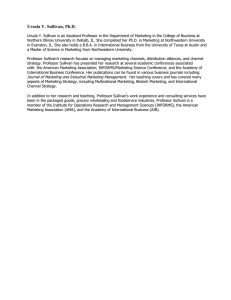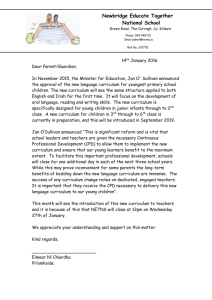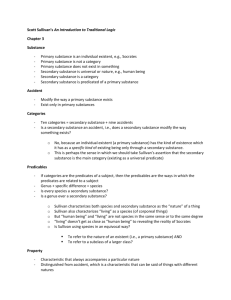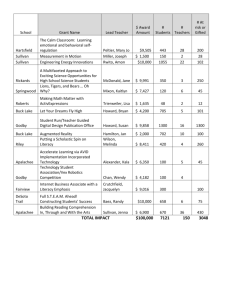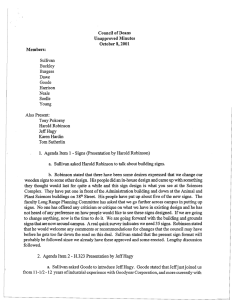Council of Deans Unapproved Minutes December 3, 2001 Members:
advertisement
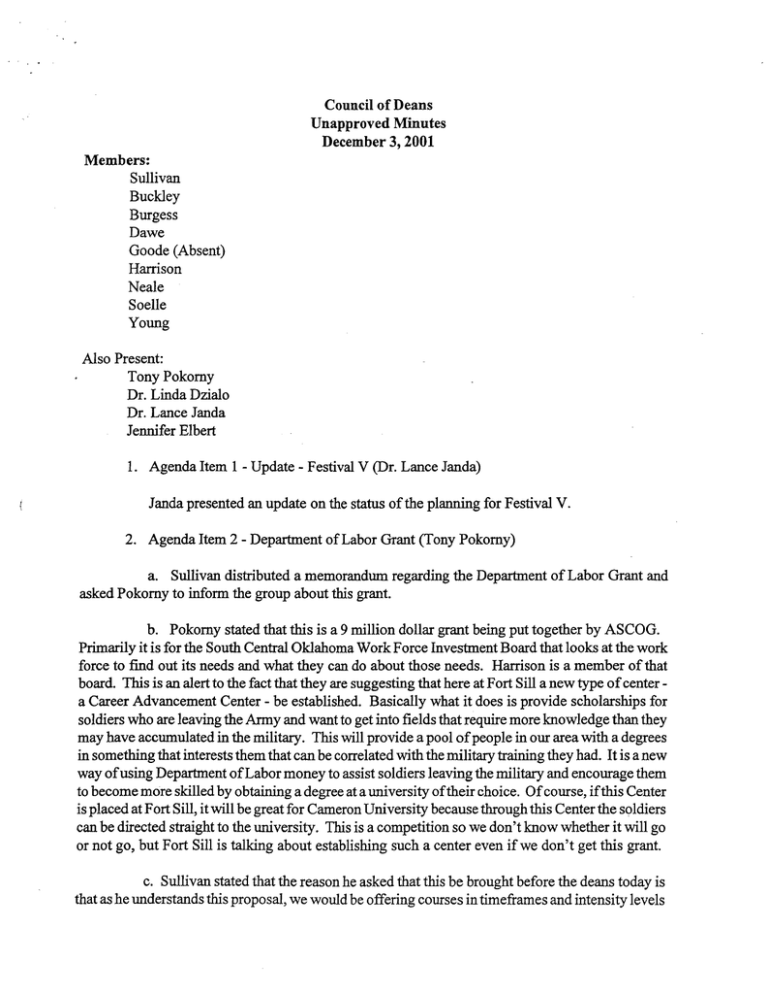
Council of Deans Unapproved Minutes December 3, 2001 Members: Sullivan Buckley Burgess Dawe Goode (Absent) Harrison Neale Soelle Young Also Present: Tony Pokorny Dr. Linda Dzialo Dr. Lance Janda Jennifer Elbert 1. Agenda Item 1 - Update - Festival V (Dr. Lance Janda) Janda presented an update on the status of the planning for Festival V. 2. Agenda Item 2 - Department of Labor Grant (Tony Pokorny) a. Sullivan distributed a memorandum regarding the Department of Labor Grant and asked Pokorny to inform the group about this grant. b. Pokorny stated that this is a 9 million dollar grant being put together by ASCOG. Primarily it is for the South Central Oklahoma Work Force Investment Board that looks at the work force to find out its needs and what they can do about those needs. Harrison is a member of that board. This is an alert to the fact that they are suggesting that here at Fort Sill a new type of center a Career Advancement Center - be established. Basically what it does is provide scholarships for soldiers who are leaving the Army and want to get into fields that require more knowledge than they may have accumulated in the military. This will provide a pool ofpeople in our area with a degrees in something that interests them that can be correlated with the military training they had. It is a new way ofusing Department ofLabor money to assist soldiers leaving the military and encourage them to become more skilled by obtaining a degree at a university oftheir choice. Ofcourse, ifthis Center is placed at Fort Sill, it will be great for Cameron University because through this Center the soldiers can be directed straight to the university. This is a competition so we don't know whether it will go or not go, but Fort Sill is talking about establishing such a center even if we don't get this grant. c. Sullivan stated that the reason he asked that this be brought before the deans today is that as he understands this proposal, we would be offering courses in timeframes and intensity levels that are different than our normal semesters. It really is a labor training focus rather than a higher education focus. We could be offering courses to the cohorts in this program that have really have nothing to do with our traditional semester arrangements. Part of the money that we would be getting would be used to hire additional faculty that would teach in a non-standard block. Pokorny stated that there would also be standard courses. 3. Sullivan asked that Dzialo talk with the group about an activity she talked about with the Executive Council this morning. a. Dzialo stated that there is a huge push in higher education in the State of Oklahoma right now in recruitment and retention. Student Affairs has been working on this. They are reading intensely everything they can put their hands on to put together the best program they can. It is the philosophy of Cameron University that we are all recruiters and that we are a team working on this together. b. Dzialo mentioned that Sullivan had suggested that her recruiters might put together some information that would help the departments in writing their recruitment and retention plans. Dzialo distributed a memo her recruiting people put together which will be useful to the deans and chairs as they prepare their plans. c. Dzialo also mentioned that they are having preliminary discussions about scheduling a major recruitment event in the Spring. This is in the very beginning stages. They are looking at the advantages and disadvantages ofhaving the event during a week day as opposed to having it on Saturday. This morning in the Executive Council there was conversation about maybe having a Friday-Saturday type event. The conversations have included student leaders and activity leaders who are very interested in taking part in this. As it is beginning to evolve, it is looking like this would be a day where juniors and seniors from allover the state would be invited to campus to participate in a variety of events. This would be a festive day with tents and food and music and activities with parents coming with their students to look the campus over and see what we have to offer. She wants it to be very upbeat. That is about as extensive as the planning is at this point. If we are going to do this there needs to be a committee that has professors, students, and Student Affairs personnel on it so that we bring everybody's perspective to the planning. Also if we are going to do it we need to get a date selected. We don't want to conflict with Arts for All and that is in May so our event would obviously have to be in April. That would give us the best chance of having nice weather. Dzialo asked for input from the deans about having the event, what part they might play, when it might be, whether it should be Friday, Saturday or Friday and Saturday and any ideas they may have for its success. Lengthy discussion followed. 4. Items from the Executive Council meeting: a. Sullivan stated that on travel requests where a van is requested, we have been asked to put the number ofpassengers in the appropriate blank so Physical Facilities can see what size van is required. 2 b. Sullivan stated that there is wording in the Faculty Handbook that talks about letting faculty know what the salary recommendation will be for them and then if they do not agree with their salary recommendation, they have an opportunity to provide additional information prior to leaving campus. That would not be a badprocess except normally we make decisions about salaries within a two or three day turnaround in June or July when most faculty are not on campus. Obviously it is not possible to follow the exact process that is outlined in the Faculty Handbook. This was an issue that came from the Faculty Council. They would"like to know if there is a way that we can make the expected salary recommendation a part of the normal evaluation process that they go through in the spring. Sullivan would like the deans thoughts on that issue. It sounds like a fair way to do it but we would need to change the wording in the Faculty Handbook. After a very lengthy discussion Sullivan stated that whatever process the departments use, just make sure the faculty member understands what the recommendation for merit pay would before they leave campus so they can rebut it if they want to. Sullivan will draft a memo and let the deans look at it. Lengthy discussion followed. 5. Agenda Item 3 - Review of Draft Memos Circulated During Nov 26 Meeting a. First draft memo to be discussed is the one on a couple of ideas for summer school. Sullivan asked if the deans had any feedback. During the lengthy discussion the following comments were made by various deans: (l) Asked faculty about the 4 day week and was told that back in the 80's they had a 4 day week during summer school and it only lasted one year. The feedback he received was that there was some concern from the administration that faculty weren't on campus the fifth day; they were taking that day off. (2) Faculty don't like the idea ofgetting less money. For the most part, even ifthey get a 3% raise they are still going backwards with the rate of inflation and it isn't a raise at all and this will take even more away. They would not be terribly interested in teaching because they can go adjunct for other schools and make more. (3) Was asked by faculty whether the deans and administration would be taking a cut in the summer or if the faculty were the only ones that would be taking a decrease in pay. (4) There was not very much discussion about the reduction in the schedule. Faculty seemed okay with doing that ifthere is a reason to do so. It was not clear to the faculty whether they would come onto campus the fifth day. (5) No problem with the four day schedule. Some concern about pay. Looking at it from an educator's point ofview, our beginning salary is $34,000 and public school teachers are almost there. Faculty feel that the little bit ofmoney they make in the summer elevates that salary and they psychologically say we make more than the public school even though they are working 3 ' .. 12 months. It is a thing with educators - they are resentful that they have spent so much time earning their degrees and working, and then have public school teachers paid more. (6) Sullivan stated that he feels he has received the feedback he needs and it appears our faculty are comfortable with five days but would at least think about a four day week depending on what happens with the fifth day but they are adamantly opposed to the 8/8 approach. He has not surveyed the students for their opinion. He wanted to get input from the deans first. Sullivan stated that his inclination is that he probably will not recommend any changes this summer. b. Next memo is about service learning. (1) Sullivan asked Neale, since she has the expertise on this subject, to give the group her input. Neale stated that she took the letter and she and the Chair sat down and made a list ofthings that the coordinator must do in order to meet the requirements specified in the letter. They have narrowed down the participants to those who are admitted to teacher education simply because they will have gone through a screening process. They must have faculty recommendation, they must go through an interview process and have a good GPA. Students who are just thinking about education would not be out there in the schools. They would have to have a firm commitment and they are going to limit their placements to the public schools. She has made a list ofall these things. Some of them will not apply to everyone. (2) Soelle mentioned that her chairs had asked that she speak with Neale, assuming that the standards have been established already. Her school would be less likely to be dealing with children. This is something they have not explored very much and they will have to talk about it. (3) Sullivan stated that he still thinks a screening process and a selection process are needed before anyone goes out into the community. They will be representing Cameron University. Neale knows where the public schools are because she has been dealing with them for years but when you put somebody out in a situation that you have never seen before, you may have to go out and physically look at it and see if there are any risks involved that you need to know about. Sullivan mentioned that he is not trying to impose the program on the scho~ls and departments. It should be their call_as to whether they participate or not but ifthey do, they must meet the standards. (4) Harrison stated that public schools are a controlled environment with a history of academic university participation so there is not going to be a problem there; it just takes care of itselfas it has been doing for a long time. It is everybody else who is the problem. There is risk and there is liability. For every department that has a faculty representative that is the supervisor of record their window ofvulnerability needs to be assessed for their liability as a supervisor for either misdeeds or mistakes that their students make. That is a tough issue - what protection does the faculty supervisor of record have and the student too. Consideration might need to be given to asking students to buy a student liability policy. Those are available at a nominal fee. Harrison feels that across all departments there needs to be a standardized contract form that departments and site fill out so that there is a uniformity ofservice learning placement paradigms community-wide rather 4 than having each department writing a contract on their own. It could be a form in our university forms. There needs to be a detailedjob description with obligations, duties, responsibilities and the aspects ofthe relationship that the site provides with regard to supervision, or feedback or training and the obligations of the student regarding punctuality, promptness, responsiveness and issues of confidentiality and things like that. All ofthat needs to be in that one document and everybody signs and then it goes in the file. (5) Sullivan stated that he would like Neale to continue to take the lead and put together a package that we can implement next fall. Discussion followed. c. Recruitment and Retention plans - any feedback on this? (1) Sullivan stated that he does not want the plan to be a big, multipage document just something real simple that says, here is what we plan to do. Soelle mentioned that in the discipline ofCriminal Justice where they have 500 majors, they don't really want to recruit but they certainly would need the dollars to retain more than to recruit. They might ask for an exception to policy with respect to a situation like that one. Soelle also mentioned that the timeline was also an issue. Sullivan stated that the thing that is driving what he is looking at here is that in the department meetings most everybody has asked him to tell them what their allocation is early. For planning purposes the deans can go ahead and take the figures shown in the memo and begin their planning. Sullivan asked for thoughts on the date to submit the plans. February was the date selected for the plans to be submitted. (2) Buckley asked if all tuition waivers were to be for recruitment rather than retention. Sullivan replied that the focus should be on recruitment. Buckley stated that in the past they have used them all for retention purposes. They have had students who financially are having trouble continuing on and they have used fee waivers to support and encourage them because they are a known quantity. (3) Young stated that she has read that retention is more important than recruitment. Sullivan replied that it depends on who is measuring what. The President's guidance is that he wanted to commit these primarily to recruiting new students this year. Ifa dean has a good argument that they need to have some ofthis money for retention, that is fme. Sullivan has observed iIi years past that we tend to find a good student and then stack waivers and scholarships on top of them so you have some students coming to school the second year with a $4,000 stack of scholarships. Buckley stated that he believes a $250 award is more important for retention purposes than for someone coming here. A $250 award isn't going to draw anybody to come here instead of going some place else, but in many cases we have students who may not be able to continue on without financial help and that is where fee waivers have been helpful. (4) Dawe mentioned that at the graduate level, they have always had the graduate coordinator sit on the scholarship committee and they examine as their principle criteria financial need followed by the GPA and how well the students have done. It is primarily for retention rather 5 " .. than recruitment. There are some different pressures on graduate students. They don't have the same access to financial aid that undergraduates do. (5) Soelle asked if the deans could allow the chairs just a little bit more flexibility in terms ofasking them to focus greater attention on recruitment but letting them make an argument if they want to. Sullivan replied that is what he was trying to get to but he doesn't want all of it going to retention; he wants some part of it going to recruiting new students. As the deans look at the department plans, try to get some balance on that. (6) Dawe asked - with respect to how the fees are allocated to the different schools, the graduate programs are integrated into the academic schools. Is there any specification of how much of that is going to graduate programs or is that up to the individual deans and department chairs? Sullivan stated that he does not know the answer to that; he took what was done last year. In the case of CAMSTEP it is in a designated amount. Sullivan will check with John Sterling on that. d. Joint Faculty Appointments memo. (1) Since there are really only two deans involved, Sullivan asked them to stay after the meeting and talk about it now or at a later time. Dawe mentioned that some of the issues here might be relevant for consideration of providing funds in support of research or other scholarly activities. Short discussion followed. (2) Harrison stated that ajoint appointment has to be an uneven appointment. They have to have a home of record. They either have to be a Center for Excellence staff member to whom they are accountable and then they have a j oint appointment working in Business or wherever to teach classes. Ifthey just have a down-the-middle joint appointment then they are an orphan and are likely not to be well taken care of. Sullivan stated that decision probably breaks down to whether we ever plan to grant them tenure. Ifthey are ever going to be tenured you need to have that home of record be in a department. Short discussion followed. (3) Sullivan stated that ifthe deans have any other feedback on any ofthese memos, to send comments to him and he will consider them. 5. Sullivan asked the deans to remain after the meeting. He has some hiring issues he wants to talk about and distribute. Adjourned 12:12 p.m. 6
